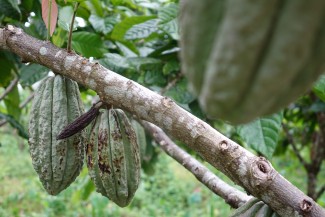Originally published by UNCTAD on 13 December 2019
UNCTAD's assessment identifies available opportunities and barriers to overcome for e-commerce to flourish in the country.
Tuvalu is raring to benefit from e-commerce and the digital economy.
The island nation is laying the building blocks to use e-commerce to power its development strategies, which put a premium on agriculture, fisheries, tourism and labour mobility as key areas of export growth.
UNCTAD’s eTrade readiness assessment of Tuvalu, launched in the capital, Funafuti, on 11 December, proposes a roadmap to help the country implement a digital economy development agenda.
“Implementing a digital economy agenda will enable Tuvalu to diversify its economy and foster development,” said Shamika N. Sirimanne, UNCTAD's director of technology and logistics.
“E-trade for Tuvalu will assist small-scale businesses to sell and buy goods online and empower women in business,” said Pulaalofa Haulagi, a senior trade officer in the country.
Opportunities and barriers
Tuvalu’s eTrade readiness assessment funded by the Enhanced Integrated Framework (EIF) recommends greater emphasis on the digital economy in the country’s national development agenda.
“With e-commerce, banking institutions will serve people better by moving from paper-based to paperless services,” said Ms. Haulagi, who is also the EIF coordinator in Tuvalu.
She added that education is also key for people to start learning about the digital economy.
Through education, such as training on coding, the country could pick the low-hanging fruits of the digital economy.
Also, education of both producers and consumers could help in bringing trust on the use of new technologies and platforms in addition to traditional channels of trade.
The implementation of the assessment’s recommendations will require the involvement of various stakeholders, including the government and the private sector. “We will also need the support of development partners to help facilitate e-commerce,” Ms. Haulagi said.
The assessment notes that some of the barriers to fostering e-commerce in Tuvalu stem from its geographic location and small size.
Tiny Tuvalu has a population of just over 11,000 and a total land area of 26 square kilometres. It’s also one of the least connected countries in the world, with high-cost and limited internet services.
Mobile penetration is at 31% while internet use is at 46% (including mobile, fixed broadband and Wi-Fi).
Access to the internet is costly compared with other Pacific economies and services are limited, particularly outside the main island of Funafuti.
This situation affects communications between households, increases the cost of doing business and hampers the delivery of services.
As a result, e-commerce service providers are not yet in place.
E-commerce at a nascent stage
Though Tuvalu has started to consider the potential benefits that e-commerce can bring to its population, its overall e-commerce enabling environment is still at a nascent stage.
The government’s capacity to strategize and implement a digital economy development agenda is limited.
Tuvalu Post’s operational readiness for e-commerce is patchy.
A World Bank-funded telecommunications and ICT development project, once completed, is expected to enhance the capacity of the country’s submarine cable.
This could increase the potential for local businesses to engage in e-commerce activities and possibly increase inter-island exchanges.
Legal and regulatory framework
No legal framework currently exists for electronic transactions, data protection and online consumer protection in Tuvalu.
The development of an enabling legal framework for e-commerce laws is considered as crucial by public and private stakeholders but has not yet been included in the country’s reform agenda.
The country has only formulated a law addressing cybercrime, but it plans to develop a Consumer Act.
It needs to take more action to develop the necessary skills to ensure consumers and businesses gain confidence in online tools.
In addition, policy coordination and dialogue among different stakeholders in the e-commerce ecosystem need to be organized.
Hindered economic potential
Tuvalu’s economic potential is hindered by its lack of natural resources, a small domestic market and an underdeveloped private sector.
The private sector consists roughly of 200 registered businesses scattered around the country’s nine islands.
Its geographic location and fragmentation across the nine islands and atolls make for difficult and expensive access to major international markets and high inter-island transport costs.
The main island of Funafuti is the economic hub but transport on the island is constrained by its size.
The limited number of both domestic and international trade opportunities and the lack of basic physical infrastructure hamper the economic development of and service delivery to the eight outer Islands.
Tuvalu is highly dependent on imports, which mostly comprise food, fuel, building materials, medicine and medical equipment, as well as consumer products including motor vehicles, appliances and clothing.
It has been characterized as a classic migration-remittances-aid-bureaucracy economy, dominated by government activities.
With limited opportunities for private business, the country relies on its public sector as the main driver of growth.
Header image of refugees from Darfur living in Chad - ©European Union (photo by Dominique Catton) via Creative Commons Attribution-NonCommercial-NoDerivs 2.0 Generic (CC BY-NC-ND 2.0)
If you would like to reuse any material published here, please let us know by sending an email to EIF Communications: eifcommunications@wto.org.


